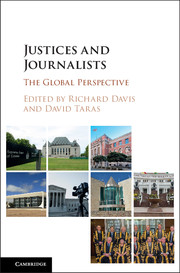Book contents
- Frontmatter
- Contents
- List of Contributors
- Acknowledgements
- Introduction: Judges and Journalists and the Spaces In Between
- 1 Judicial Communication: (Re)Constructing Legitimacy in Argentina
- 2 Communication beyond the Judgments: The Australian High Court, Speaking for Itself, but Not Tweeting
- 3 Uncommon Transparency: The Supreme Court, Media Relations, and Public Opinion in Brazil
- 4 The “Uncomfortable Embrace”: The Supreme Court and the Media in Canada
- 5 Germany: The Federal Constitutional Court and the Media
- 6 The Supreme Court and Media in Ghana's Fourth Republic: An Analysis of Rulings and Interactions between Two Estates of the Realm
- 7 The Puzzle of Judicial Communication in Indonesia: The Media, the Court, and the Chief Justice
- 8 Carping, Criticizing, and Circumventing: Judges, the Supreme Court, and the Media in Israel
- 9 Judicial Communication in South Korea: Moving toward a More Open System?
- 10 Changing the Channel: Broadcasting Deliberations in the Mexican Supreme Court
- 11 Norway: Managed Openness and Transparency
- 12 Judicial Institutional Change and Court Communication Innovations: The Case of the UK Supreme Court
- 13 Symbiosis: The US Supreme Court and the Journalists Who Cover It
- Conclusion
- Index
Introduction: Judges and Journalists and the Spaces In Between
Published online by Cambridge University Press: 16 February 2017
- Frontmatter
- Contents
- List of Contributors
- Acknowledgements
- Introduction: Judges and Journalists and the Spaces In Between
- 1 Judicial Communication: (Re)Constructing Legitimacy in Argentina
- 2 Communication beyond the Judgments: The Australian High Court, Speaking for Itself, but Not Tweeting
- 3 Uncommon Transparency: The Supreme Court, Media Relations, and Public Opinion in Brazil
- 4 The “Uncomfortable Embrace”: The Supreme Court and the Media in Canada
- 5 Germany: The Federal Constitutional Court and the Media
- 6 The Supreme Court and Media in Ghana's Fourth Republic: An Analysis of Rulings and Interactions between Two Estates of the Realm
- 7 The Puzzle of Judicial Communication in Indonesia: The Media, the Court, and the Chief Justice
- 8 Carping, Criticizing, and Circumventing: Judges, the Supreme Court, and the Media in Israel
- 9 Judicial Communication in South Korea: Moving toward a More Open System?
- 10 Changing the Channel: Broadcasting Deliberations in the Mexican Supreme Court
- 11 Norway: Managed Openness and Transparency
- 12 Judicial Institutional Change and Court Communication Innovations: The Case of the UK Supreme Court
- 13 Symbiosis: The US Supreme Court and the Journalists Who Cover It
- Conclusion
- Index
Summary
Much has been written about the need for an independent judiciary to act as a check against the arbitrary use of government power and as the great insurer of individual and human rights. Indeed, an independent judiciary is the linchpin of democracy; without it the power of the executive cannot be limited or made accountable. But judges need journalists to make their voices heard. Without the press, judgments would not be publicized, inaccuracies and misinformation might not be corrected, and the public would be unaware of the laws under which it is governed. More to the point, judges also need favorable press coverage. Without positive coverage, judges run the risk of having their judgments mocked and delegitimized and the trust on which their authority rests eroded. In the end, journalists have the last word deciding which judgments make news and which judgments remain in the shadows. While judges are often reluctant participants in the media game, the failure to play it well can be devastating.
There is also an impressive literature extolling the need for a vigorous press to act as a bulwark against corruption, secrecy, and the misuses of power. As the legendary journalist Walter Lippmann famously wrote about the power of the press, “it is like the beam of a searchlight that moves restlessly about, bringing one episode and the other out of darkness and into vision.” Without a free and vigilant press, citizens would be deprived of much of the information that they need to make decisions about their lives. Yet little has been written about the relationships between judges and journalists and the need for high courts in particular to undergo the same level of scrutiny and criticism that political leaders, corporations, and civic organizations endure. Without that scrutiny, arbitrariness, corruption, and errors would go unreported. Until recently, high courts have been shielded from media exposure by the high walls of tradition and authority. Yet over the period of the last 20 years, many of these walls have come crashing down. Journalists have gained increasing access to high courts, and high courts have developed complex strategies for navigating through media waters and negotiating their relationship with journalists.
- Type
- Chapter
- Information
- Justices and JournalistsThe Global Perspective, pp. 1 - 13Publisher: Cambridge University PressPrint publication year: 2017
- 1
- Cited by



